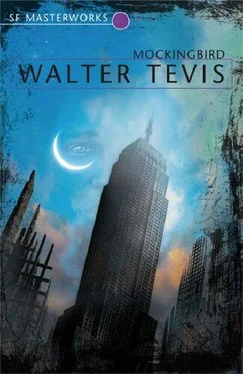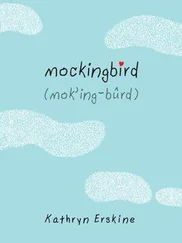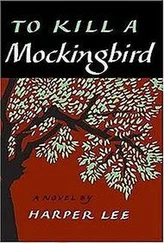A technique existed for making a recording of every neural pathway, every learning pattern of an adult human brain and transferring that recording to the metal brain of a robot. This technique had been used only for the Make Nine series; all of the robots in that series had been equipped with altered copies of the living brain of a single man. That man was a brilliant and melancholy engineer named Paisley—although Spofforth was never to know that. The network of information bits and interconnections that made up Paisley’s brain had been recorded on magnetic tapes and stored in a vault in Cleveland. What happened to Paisley after his mind was copied no one ever knew. His personality, his imagination, and his learning had all been recorded on tapes when he was forty-three, and afterward the man was forgotten.
The tapes were edited. The personality was removed from them as much as was possible without harming the “useful” functions. Just what was “useful” about a mind had been determined by engineers less imaginative than Paisley himself. The memory of the life was erased, and with it much of the learning, although the syntax and vocabulary of English remained on the tapes. They contained, even after editing, a near-perfect copy of an evolutionary miracle: a human brain. Some unwanted things from Paisley remained. The ability to play the piano was in the tapes, but needed a body with arms and hands to be manifest. But when the body was made there would be no piano for it to play.
Unwanted by the engineers who had made the recording, but unavoidable, were fragments of old dreams, yearnings, anxieties. There was no way to rid the tapes of these without damaging other functions.
The recording was transferred electronically to a silvery ball, nine inches in diameter, made up of thousands of layers of nickel-vanadium, spun and shaped by automatic equipment. The ball was placed in the head of a body cloned especially for it.
The body was grown carefully in a steel tank, at what had once been an automobile plant in Cleveland. The result was perfect— tall, powerful, athletic, beautiful. It was a black man in the prime of life, with fine muscles, powerful lungs and heart, kinky black hair, clear eyes, a beautiful, thick-lipped mouth, and large, strong hands.
Some human things had been altered: the aging process had been programmed to stop at the physical development of a thirty-year-old—which was where the body had arrived after four years in the steel tank. It was equipped to control its own pain responses, and was, within limits, self-regenerating. It could, for instance, continue to grow new teeth, or new fingers or toes, as needed. It would never go bald or develop faulty vision or cataracts or thickened arteries or arthritis. It was, as the genetic engineers were fond of saying, an improvement upon the work of God. Since none of the engineers believed there was a God, however, their self-praise was unsound.
Spofforth’s body had no reproductive organs. “To avoid distractions,” one of the engineers said. The earlobes on each side of the magnificent head were jet black to signify to any human being who might be awed by this imitation man that he was, after all, only a robot.
Like the Frankenstein monster, he was given active life by electrical shock; he emerged from his tank fully grown and able to talk, a bit thickly at first. In the vast and cluttered factory room where he was brought into awareness his dark eyes looked around him with excitement and life. He was on a stretcher when he first experienced the power of consciousness enveloping his nascent being like a wave, becoming his being. His constricted throat gagged and then cried out at the force of it—at the force of being in the world.
He was named Spofforth by one of the few men who still knew how to read. The name came, at random, from an ancient Cleveland telephone directory: Robert Spofforth. He was a Make Nine robot, the most sophisticated single piece of equipment ever to be fashioned by human ingenuity.
Part of his first year’s training sent him to monitoring the hallways and doing minor chores at a dormitory school for human beings. It was a place where the young were taught the ways of their world: Inwardness, Privacy, Self-fulfillment, Pleasure. It was there that he saw the girl in the red coat and fell in love.
Through that winter and through the early spring the girl always wore a scarlet coat with a black velvet collar, as black as anthracite, as black as her hair against her white skin. Her red lipstick matched her coat. In those days almost no one wore lipstick anymore and it was a wonder that she even owned some. She looked beautiful wearing it. When Spofforth first saw her, on his third day at the dormitory compound, she was almost seventeen. His mind photographed her instantly and for all time. This picture was to become a major part of the sadness that began, in springtime, in June, to settle deeply into his manufactured and potent being.
By the time he was a year old Spofforth understood quantum mechanics, robotic engineering, and the history of state-owned corporations in North America—all taught to him by audio-visuals and by robot tutors—but he did not know how to read. Nor did he know anything about human sexuality, not consciously; although there were dim yearnings in what once would have been called his heart. Sometimes when he was alone and in darkness, his stomach would flutter for a moment disturbingly. He was beginning to know that in him somewhere was a buried life, a life of feelings. On the first warm evenings of his first June he began to be seriously disquieted by it. Walking from one dormitory building to another, late at night, he would hear the sounds of katydids in the trees in the warm Ohio evening and there would be a strange, uncomfortable pressure in his chest. He worked hard at the dormitories, doing much menial work for what was called “training”; but the work seldom really occupied his attention and melancholy had begun to fall on his spirit.
Some of the Make Four workers would break down occasionally; there never seemed to be enough repair equipment to keep up with minor malfunctions. A few old men were kept around to fill in when that happened. One of these was a derelict named Arthur, who usually smelled of synthetic gin and who never wore socks. He always spoke to Spofforth, in a partly friendly, partly mocking way, when they would pass each other in the dormitory hallways or on one of the gravel paths outside the buildings. Once, while Spofforth was emptying ashtrays in the cafeteria and Arthur was sweeping up, Arthur stopped working, leaned on his broom, and said, “Bob,” and Spofforth looked up from his work. “Bob,” Arthur said, “you’re a moody one. Didn’t know they made moody robots.”
Spofforth was unsure whether he was being teased or not. He continued carrying a stack of plastic ashtrays, filled with the morning’s array of marijuana butts, to the garbage can in the corner of the big room. The students had left a short time before for a televised lecture on yoga.
“Never saw a sad robot before,” Arthur said. “Is that because of those black ears?”
“I’m a Make Nine robot,” Spofforth said defensively. He was still very young, and conversations with humans could make him uneasy.
“Nine!” Arthur said. “That’s pretty high, isn’t it? Hell the Andy that runs this school is only a Seven.”
“Andy?” Spofforth said, holding the pile of ashtrays.
“Yeah, android. Andys is what we called you things—you guys —when I was a kid. Weren’t so many of you then. Weren’t so smart either.”
“Do you mind that? That I’m smart?”
“No,” Arthur said. “Shit no. People are so fucking dumb these days it makes you want to cry.” He looked away, and then gave a little push to his broom. “Smart is smart. I’m glad there’s some around somewhere.” He stopped sweeping and made a loose gesture around the big empty room as though the students were still there. “I wouldn’t want any of those dumb illiterates to be running the show when they get out of here.” His wrinkled face was rilled with contempt. “Hypnotized freaks. Jack-offs. They ought to put ’em in a coma and feed ’em pills.”
Читать дальше











